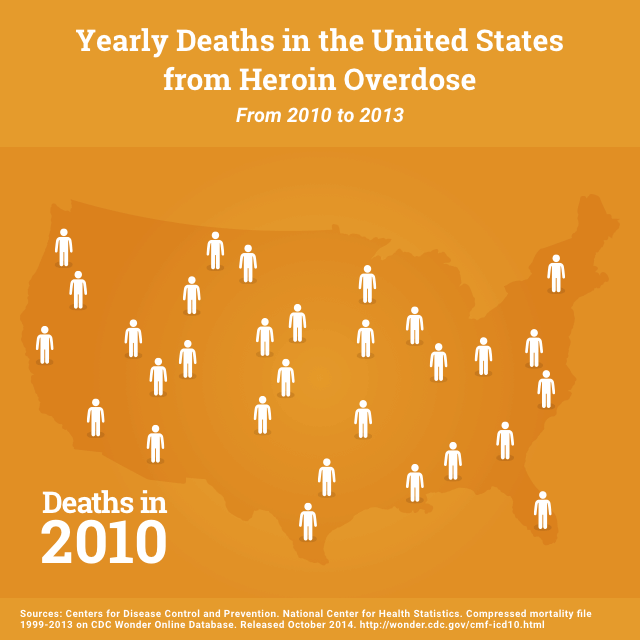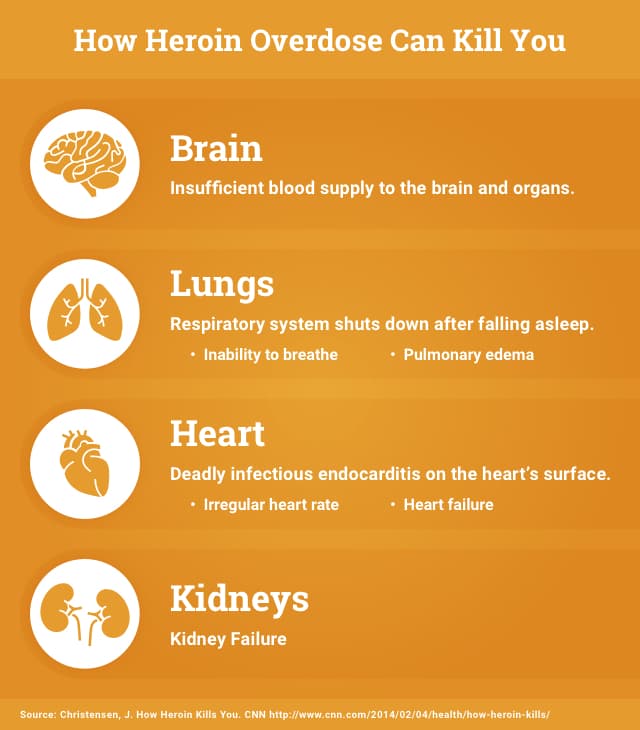How Heroin Addiction and Overdose Cause Death
How Heroin Addiction Can Kill You
Heroin is highly addictive, as the body can develop a strong physical craving for this pleasure-producing drug quite rapidly.3 Getting high from heroin may start out as an intensely pleasurable – even euphoric – experience.

With such high rates of accidental overdose from heroin, you gamble with your life when you use heroin.
If you are addicted to heroin, however, you will experience a number of upsetting and unpleasant symptoms of withdrawal when attempting to quit. In fact, many people commonly resume using heroin just to avoid such an uncomfortable withdrawal experience.
As you begin to develop more and more tolerance to the effects of the drug – all the while attempting to keep your withdrawal symptoms at bay, the cycle of addiction is perpetuated. This means that you will become dependent on needing more and more heroin to achieve the same physical high you got at the beginning.

A budding heroin dependence is dangerous in more than one way. Continued use of heroin not only leads to a number of chronic and life-threatening health problems, but it is also associated with high rates of accidental death by overdose.
Common ways in which heroin addiction can lead to death include:
#1. Long-term Organ Consequences.
The risk of heart attacks increase with the accumulation of heroin additives and byproducts. These same byproducts can also introduce infections or clots to the lungs, blood vessels, heart and liver. It is not uncommon for heroin to be cut with an additive.2 The type of additive can range anywhere from household cleaners to other poisons and can increase the potency of the drug dose.
#2. HIV/AIDS.
Users who inject the drug must take necessary precautions in terms of sanitation and sterilization of their drug paraphernalia. Sharing needles with someone else can increase the risk for contracting serious and life-threatening diseases that pass through the blood, including HIV/AIDS.4
#3. Hepatitis.
While media attention tends to focus on HIV/AIDS, liver diseases such as hepatitis B and hepatitis C-can be equally, if not more, dangerous to heroin users.
#4. Overdose.
Sadly, it is a relatively common occurrence for emergency rooms all across the country to admit individuals who have overdosed on heroin.4 Using too much heroin can result in dangerously slowed heart and respiratory rates – reducing oxygen in the body and causing widespread organ failure and brain injury.
As with most other drug habits, the lifestyle accompanying heroin addiction is typically not a healthy one.
The negative effects of heroin use can be multiplied when combined with other risky behaviors or poor health choices.
Heroin users have tended to be more likely than non-users to also abuse other recreation drugs, smoke cigarettes, avoid regular exercise, and have very poor nutritional habits.5
All these components contribute to an unhealthy lifestyle that, over time, may contribute to premature death.
Heroin Death Rates
In 2013 alone, there were 8,257 deaths in the U.S. from heroin overdose. This number more than doubled from 2010 when there were only 3,036 deaths from heroin overdose.6
It was found that those addicted to heroin had a death rate 63 times the rate of non-heroin users.
In one Swedish research study, 115 individuals struggling with heroin addiction were studied over 5-8 years to see just how different their death rates were compared to non-heroin users of the same age and sex.1
How Much Heroin Can Cause an Overdose?
The amount of heroin that would make for an overdose differs, depending on the individual’s characteristics, the route of administration and current tolerance level of the individual.
While the estimated lethal dose for someone who is new to heroin may be between 200-500 mg, some with higher tolerance levels have been reported to be able to tolerate up to 1800 mg.7
An amount that may leave one person unaffected may end up being a lethal amount for another person. Additionally, heroin obtained from the street has widely variable purity levels and additives – making it even harder to accurately identify what a lethal dose might be.
What Makes Heroin Overdose Lethal?
- Toxic levels of heroin can dangerously depress the brain’s respiratory center, leading to markedly slowed rates of breathing and, finally, to respiratory arrest.
- Slowed heart rate and a bottoming out of blood pressure can lead to cardiovascular collapse.
- Your heart can develop irregular rate and rhythm, compromising its ability to provide adequate blood flow to your brain and other organs, and increasing your risk for cardiac arrest.
- A failing heart can precipitate a backup of blood through the lungs, leading to pulmonary edema. This can complicate an already failing respiratory system or lead to kidney and other end-organ failure.7
- Your can get a deadly infection on the heart’s surface called, “infectious endocarditis.”8
Are You or a Loved One Addicted to Heroin?
How do you know if you or a loved one is addicted to heroin? According to the Diagnostic and Statistical Manual of Mental Disorders, 5th Edition (DSM-V), you should look for an ongoing use of drugs or alcohol that has begun to cause significant life interference.5
Significant life interference may occur in the form of health problems, disability or difficulty meeting demands at work, home, or school.
In order to meet criteria for a diagnosis of a substance use disorder, there must be evidence of the individual’s impaired control, interpersonal difficulties, and risky use.

Look for any of the following signs and symptoms if you suspect a possible addiction:
- Heroin use over a longer time frame or in larger amounts than was originally anticipated.
- Repeated, unsuccessful attempts at quitting.
- Continued heroin use despite risk of physical safety.
- Excessive interest in heroin.
- Increased tolerance to the amount of heroin used.
- Excessive amount of time spent to obtain or recover from heroin.
- Increased difficulties across multiple areas of life-including at home, school, work and in interpersonal relationships.
- Increased problems with law enforcement officers-including theft, prostitution and drug dealing.
- Social isolation.
- Loss of interest in previously enjoyed activities and occupational activities.
- Vacillating moods.
- “Track marks” on the body on sites of repeated injection.
- Scabs on the skin.
- Physical signs and symptoms of intoxication and withdrawal.
- Craving for heroin, fear and anxiety over not getting heroin.
- Runny nose.
- Watery eyes.
- Twitching muscles.
- Yawning.
- Itching.
- Hyperactive bowl sounds.
- Chronic head and neck problems (especially from heroin snorting).
- Nose bleeds.
- Perforated nasal septum.
- Sinusitis.
- Eustachian tube dysfunction.
- Chronic respiratory problems (especially from heroin smoking).
- Coughing.
- Bronchitis.
- Pneumonitis.
How Does Addiction to Heroin Develop?
Addiction to heroin is present when you develop both a physical and a psychological dependence on the drug.3 When you are physically dependent on heroin, the circuitry in your brain has been altered so that you will experience many unpleasant withdrawal symptoms when you’re no longer using the drug.
Psychological dependency on heroin occurs when you believe you must continue to use the substance in order to function on a day-to-day basis.
Get Out of Your Addiction and Seek Help
If you or someone you love is exhibiting the signs and symptoms of heroin addiction, it’s important to educate yourself about getting the help you need to break free from addiction.
Addiction to heroin does not have to be a death sentence. Substance abuse treatment can help you break the cycle of heroin addiction before it is too late.

Let Us Help You.
Call to speak with one of our caring recovery advisors who can help you take the next steps.
Who Answers?Sources
- Gronbladh L, Ohlund LS, Gunne LM. Mortality in heroin addiction: impact of methadone treatment. Acta Psychiatr Scand. 1990;82(3), 223-7.
- Hughes PH, Barker NW, Crawford GA, Jaffe JH. The natural history of a heroin epidemic. Am J Public Health 1972;62(7):995-1001.
- National Institute on Drug Abuse: Heroin.
- Stephens RC. The street addict role: A theory of heroin addiction. 1991 Suny Press. Albany, NY.
- Heroin. Drugs-Forum.com.
- Centers for Disease Control and Prevention, National Center for Health Statistics. Compressed mortality file 1999-2013 on CDC WONDER Online Database, Released October 2014.
- The risk of heroin overdose. Schaffer Library of Drug Policy.
- Christensen, J. How heroin kills you. CNN.
Heroin Rehabilitation Directory
Select a state to learn more about your treatment options.- Alabama
- Alaska
- Arizona
- Arkansas
- California
- Colorado
- Connecticut
- Delaware
- District Of Columbia
- Florida
- Georgia
- Hawaii
- Idaho
- Illinois
- Indiana
- Iowa
- Kansas
- Kentucky
- Louisiana
- Maine
- Maryland
- Massachusetts
- Michigan
- Minnesota
- Mississippi
- Missouri
- Montana
- Nebraska
- Nevada
- New Hampshire
- New Jersey
- New Mexico
- New York
- North Carolina
- North Dakota
- Ohio
- Oklahoma
- Oregon
- Pennsylvania
- Rhode Island
- South Carolina
- South Dakota
- Tennessee
- Texas
- Utah
- Vermont
- Virginia
- Washington
- West Virginia
- Wisconsin
- Wyoming
Help for Heroin Addiction
Do you know someone suffering from heroin addiction? Help is available. To find out more, please choose the selection that applies to you or the person suffering from addiction:
Fill out the form below to be contacted.
Repair the damage and start fresh today!



